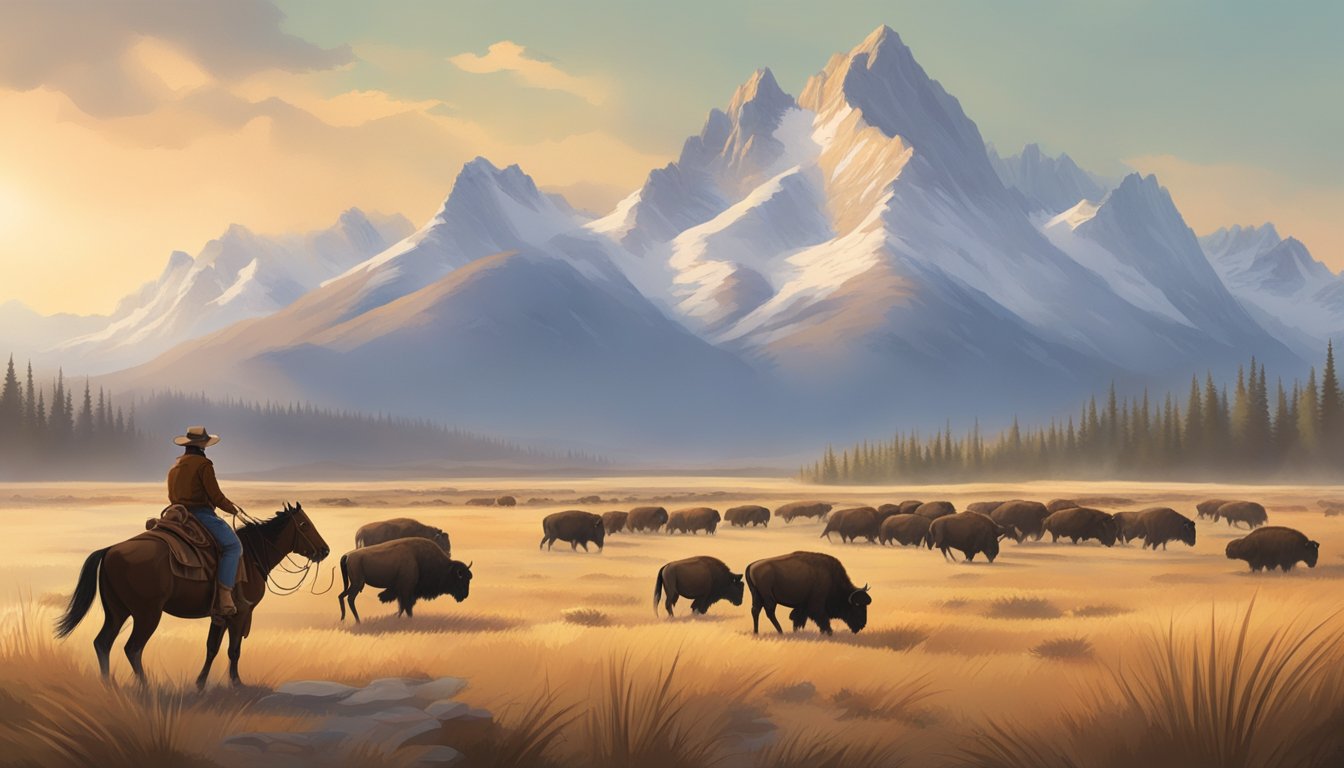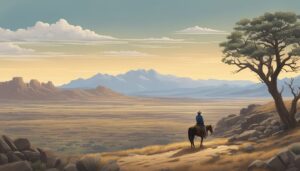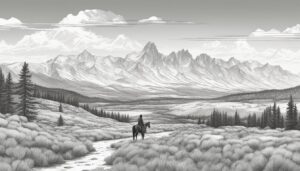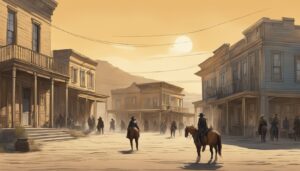The American Western genre has produced many iconic heroes, but two stand out in recent memory: John Dutton from the TV series “Yellowstone” and Bret Maverick from the 1994 film “Maverick.” Both characters embody different aspects of the classic Western protagonist, captivating audiences with their unique approaches to the challenges of the frontier.
John Dutton, portrayed by Kevin Costner, is a modern-day rancher fighting to preserve his family’s legacy and vast landholdings. His character is defined by unwavering determination and a willingness to do whatever it takes to protect his interests. While John Dutton’s loyalty to family and tradition makes him a compelling figure, his often ruthless methods and moral ambiguity add complexity to his heroic status.
In contrast, Bret Maverick, played by Mel Gibson in the 1994 film, represents a lighter take on the Western hero. A charming gambler with a quick wit, Maverick relies on his cleverness and luck to navigate the dangers of the Old West. His character offers a refreshing departure from the stoic, gun-slinging cowboys often associated with the genre.
Character Profiles

John Dutton and Bret Maverick stand as iconic Western figures, each with distinct personalities and motivations that have captivated audiences. Their character traits and backgrounds shape their approaches to challenges and relationships.
John Dutton of Yellowstone
John Dutton, portrayed by Kevin Costner, is the formidable patriarch of the Dutton family and owner of the largest cattle ranch in Montana. His character embodies unwavering determination and a fierce loyalty to his land and legacy.
John’s complex personality blends rugged toughness with moments of vulnerability, particularly concerning his family. He navigates the harsh Montana landscape and cutthroat business world with equal skill.
The Yellowstone Ranch serves as an extension of John’s identity, driving his actions and often putting him at odds with developers, politicians, and even his own children. His moral compass, while occasionally ambiguous, consistently prioritizes the preservation of his family’s way of life.
Bret Maverick of Maverick
Bret Maverick, played by Mel Gibson in the 1994 film, is a charming and cunning gambler with a quick wit and even quicker draw. Unlike the stoic John Dutton, Maverick relies on his charm and cleverness to navigate the Wild West.
Maverick’s character is defined by his love for poker, his ability to talk his way out of trouble, and his reluctance to engage in violence unless absolutely necessary. His likability stems from his roguish charm and self-deprecating humor.
While not tied to land or legacy like Dutton, Maverick’s ambitions center around winning at cards and outsmarting his opponents. His moral code, though flexible, ultimately leans towards doing the right thing, often in unconventional ways.
Cultural Impact and Legacy

John Dutton and Bret Maverick have left indelible marks on the Western genre, influencing popular media and expanding into franchises and merchandise. Their characters have redefined the modern Western hero and captivated audiences across generations.
Influence in Popular Media
John Dutton from Yellowstone has become a cultural icon, reshaping the perception of modern Westerns. The show’s popularity has sparked renewed interest in ranch life and Western aesthetics. Dutton’s character embodies the struggles of maintaining tradition in a changing world, resonating with viewers and inspiring discussions about land ownership and family legacy. His impact extends to fashion trends, with viewers emulating the Dutton family’s rugged style.
Bret Maverick, portrayed in the 1994 film, brought a lighthearted twist to the Western genre. His charm and wit influenced subsequent portrayals of Western characters, demonstrating that heroes could be both clever and comical. Maverick’s approach to problem-solving through wit rather than violence offered a refreshing take on the traditional Western protagonist.
Expansion of Franchise and Merchandise
Yellowstone’s success has led to a rapidly growing franchise. Paramount has capitalized on the show’s popularity by developing spin-offs like “1883” and “6666”. These expansions explore different time periods and locations within the Dutton family saga. The Yellowstone brand now includes clothing lines, home decor, and even themed vacations to Montana ranches.
Merchandise for Maverick, while more limited, has included collectibles and home media releases. The character’s enduring appeal has led to occasional revivals and references in other Western-themed media. Both franchises have tapped into the nostalgia and fascination with the American West, creating lasting legacies that continue to engage fans and influence the entertainment industry.
Themes and Motifs

John Dutton and Bret Maverick navigate complex themes of power, family, and personal growth in their respective Western narratives. Their stories intertwine elements of conflict, loyalty, and individual struggles against the backdrop of the American frontier.
Conflict and Power Struggles
John Dutton faces constant threats to his Yellowstone ranch, battling land developers, indigenous tribes, and rival ranchers. He wields his influence to protect his family’s legacy, often resorting to ruthless tactics. Chief Thomas Rainwater emerges as a formidable opponent, fighting for indigenous land rights.
Bret Maverick, in contrast, engages in power struggles through wit and charm. He outsmarts opponents in high-stakes poker games, using his intellect to gain the upper hand. Maverick’s conflicts are more personal and less violent, focusing on outsmarting rivals rather than physical confrontations.
Both characters navigate complex power dynamics, but their approaches differ significantly. Dutton relies on force and intimidation, while Maverick employs cunning and charisma.
Family and Loyalty
The Dutton family forms the core of Yellowstone’s narrative. John’s children – Beth, Jamie, and Kayce – play crucial roles in the ranch’s operations and conflicts. Loyalty is tested as family members clash over decisions and personal ambitions.
Rip Wheeler, though not blood-related, demonstrates unwavering loyalty to John Dutton. His devotion to the family highlights the theme of chosen family in the Western genre.
Maverick, as a solo character, explores loyalty differently. His relationships are fleeting, formed and broken over card games. His loyalty lies primarily with himself, contrasting sharply with the Duttons’ family-first mentality.
Personal Struggles and Triumphs
John Dutton grapples with the weight of preserving his family’s legacy. His inner turmoil manifests in tough decisions that often blur moral lines. Beth Dutton battles personal demons stemming from past trauma, showcasing vulnerability beneath a tough exterior.
Kayce Dutton, a former Navy SEAL, struggles to balance his family duties with his own desires. His journey highlights the challenges of personal growth within the constraints of family expectations.
Maverick’s personal struggles center on his gambling addiction and the constant pursuit of the next big win. His triumphs come from outsmarting opponents and escaping sticky situations through quick thinking and charm.
Both characters face inner conflicts, but Dutton’s struggles are more deeply rooted in family and legacy, while Maverick’s revolve around personal freedom and survival.
Character Development and Arcs

John Dutton and Bret Maverick undergo significant transformations throughout their respective stories. Their character arcs reveal complex personalities shaped by relationships and circumstances.
Evolution Over Seasons
John Dutton’s journey in Yellowstone spans multiple seasons, allowing for gradual development. Initially focused solely on preserving his ranch, John becomes more nuanced as the series progresses. He faces moral dilemmas that challenge his principles and force him to adapt.
Beth Dutton, John’s daughter, experiences substantial growth. Her fierce exterior softens slightly as she forms deeper connections, particularly with Rip Wheeler. This relationship brings out her vulnerability while maintaining her trademark strength.
Kayce Dutton grapples with his identity, torn between family loyalty and personal aspirations. His arc explores themes of duty and self-discovery.
Relationship Dynamics
The Dutton family’s complex interactions drive much of Yellowstone’s character development. John’s relationships with his children – Beth, Kayce, and Jamie – evolve as trust is tested and alliances shift.
Bret Maverick’s character in the 1994 film develops through his encounters with various individuals. His charm and wit are consistently on display, but his interactions reveal deeper layers of his personality.
Rip Wheeler’s unwavering loyalty to the Duttons, especially Beth, shapes his arc. Their romance adds depth to both characters, revealing softer sides beneath tough exteriors.
Jamie Dutton‘s relationship with his adoptive family becomes increasingly strained, leading to significant character shifts and moments of betrayal.
Setting and Aesthetics

The settings of “Yellowstone” and “Maverick” offer distinct visual landscapes that shape their characters and narratives. From rugged mountain ranges to bustling riverboat casinos, each environment plays a crucial role in defining the Western hero.
Montana Landscape and Culture
“Yellowstone” immerses viewers in the breathtaking vistas of Montana. The Yellowstone Dutton Ranch, a sprawling cattle operation, serves as the centerpiece. Majestic mountains, expansive prairies, and the iconic Yellowstone National Park create a stunning backdrop.
This landscape reflects the rugged nature of John Dutton’s character. The harsh beauty of Montana shapes the local culture, emphasizing self-reliance and a deep connection to the land.
Paramount’s “Yellowstone” expertly captures the essence of modern ranch life, blending traditional Western elements with contemporary challenges.
Fashion and Cinematography
“Yellowstone” embraces a neon-Western aesthetic, updating classic cowboy attire for the 21st century. John Dutton’s wardrobe features tailored shirts, well-worn jeans, and custom boots, reflecting his status as a powerful rancher.
The show’s cinematography highlights Montana’s natural beauty. Wide shots showcase vast landscapes, while intimate scenes capture the nuances of ranch life. Warm, golden hues dominate, evoking a sense of nostalgia and timelessness.
“Maverick” opts for a more traditional Western look, with period-appropriate costumes and set designs. Its cinematography focuses on creating a romanticized version of the Old West, emphasizing action and adventure.
Cast and Performance

Kevin Costner and Mel Gibson take center stage as the iconic Western heroes John Dutton and Bret Maverick. Their portrayals bring depth and charisma to these complex characters, supported by talented ensembles that elevate both productions.
Main Characters Portrayal
Kevin Costner embodies John Dutton with grit and gravitas. His performance anchors Yellowstone, bringing a commanding presence to the patriarch’s role. Costner’s nuanced acting conveys Dutton’s inner struggles and fierce determination.
Mel Gibson infuses Bret Maverick with charm and wit. His portrayal balances comedy and action, capturing Maverick’s roguish appeal. Gibson’s timing and charisma shine throughout the film, making Maverick a memorable character.
Both actors draw on their extensive experience in Westerns to deliver authentic, compelling performances. Their star power and skill bring these characters to life, creating enduring Western heroes.
Supporting Cast Contributions
Yellowstone boasts a stellar ensemble. Kelly Reilly’s fiery portrayal of Beth Dutton stands out, while Luke Grimes brings depth to Kayce Dutton. Cole Hauser’s Rip Wheeler and Wes Bentley’s Jamie Dutton add layers to the family dynamics.
Maverick features strong supporting performances. Jodie Foster sparkles as Annabelle Bransford, matching Gibson’s wit. James Garner, the original TV Maverick, adds a nostalgic touch as Marshal Zane Cooper.
Both casts elevate their respective productions. Yellowstone’s ensemble creates a rich, interconnected world. Maverick’s supporting players enhance the film’s humor and adventure, complementing Gibson’s lead performance.
Reception and Critique

John Dutton and Bret Maverick have both captivated audiences with their distinct Western personas. Their portrayals have garnered significant attention from viewers and critics alike, shaping the perception of modern Western heroes.
Audience Reception and Ratings
“Yellowstone” has become a ratings juggernaut, with John Dutton at its center. The show’s fifth season premiere drew 12.1 million viewers, breaking records for the Paramount Network. Fans praise Kevin Costner’s portrayal of the complex rancher patriarch, appreciating his blend of toughness and vulnerability.
Mel Gibson’s Bret Maverick also resonated with audiences upon release. The 1994 film grossed over $180 million worldwide, demonstrating strong appeal for its lighter take on Western tropes. Viewers enjoyed Gibson’s charismatic performance as the clever gambler.
Critical Analysis
Critics have scrutinized both characters through different lenses. John Dutton is often viewed as a symbol of the modern American West, with reviewers noting the show’s exploration of land disputes, family dynamics, and political power. Some praise the moral ambiguity of his actions, while others critique the character’s ruthless tactics.
Bret Maverick received generally positive reviews for its wit and charm. Critics appreciated the film’s departure from traditional Western seriousness, highlighting Gibson’s comedic timing. However, some felt the character lacked depth compared to grittier Western protagonists.
Both portrayals have sparked discussions about identity and security in the Western genre, with John Dutton representing a more dramatic, “neon-Western” approach and Maverick offering a lighter, comedic take.



